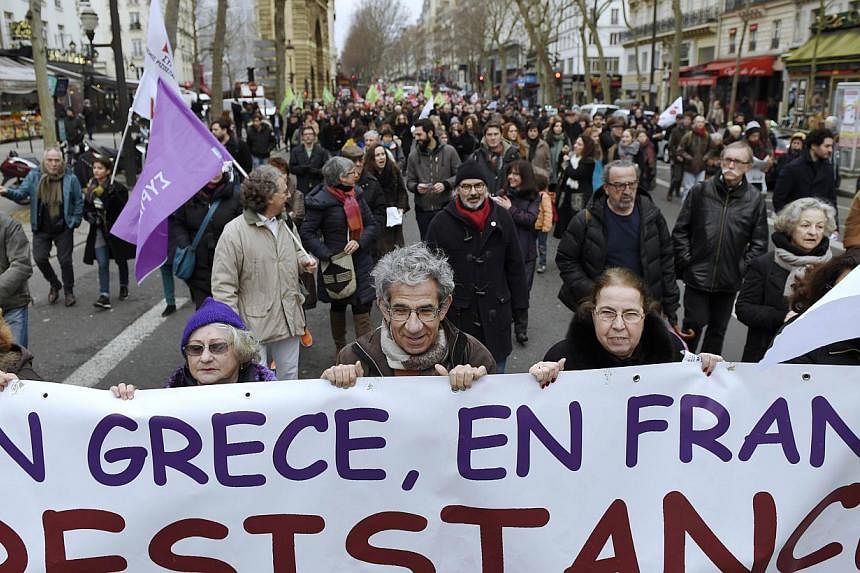ATHENS (AFP) - Greece on Sunday expressed confidence that a deal with the European Union over its loathed bailout could be reached, but also warned the Feb 28 deadline may be too tight.
As Athens was steeling itself for a meeting of eurozone finance ministers in Brussels on Monday, Prime Minister Alexis Tsipras told media in Germany, Europe's sceptical paymaster, "we don't need money, we need time to realise our reform plans".
He said he was holding out for "a win-win solution", because "I want to save Greece from tragedy and prevent Europe from being divided."
"I promise you Greece will be a different country in six months," he was quoted as saying by news weekly Stern.
Finance Minister Yanis Varoufakis also suggested the talks may run over deadline, though he said he was sure Greece's high-stakes gamble would pay off.
"Our strong stance, based on logic, will lead to an agreement, even at five minutes past the hour," he said in an interview with the Sunday Kathimerini newspaper.
Greece risks being forced out of the eurozone if a deal is not found by the end of the month.
The new leftist government wants a "bridge programme" which would tide Greece over while it negotiates a new deal on an austerity programme that it says has punished ordinary Greeks, creating desperate poverty and sky-high unemployment.
In Athens on Sunday thousands of flag-waving Greeks massed in front of parliament to show support for the last-ditch bid to persuade Brussels to loosen the noose of austerity.
The scene was dominated by a poster showing German Chancellor Angela Merkel dressed in Europe's flags, with Varoufakis pulling the Greek colours out of her naked bottom.
"Stop Merkel, start democracy," read another banner. "Stop austerity, support Greece, change Europe."
"I'm not afraid of anything, whatever bad was going to happen has already happened," 62-year-old pensioner Vimitra said, referring to five years of severe austerity in the debt-laden country.
Fellow protester Soula, 22, said she was confident Greece would triumph in Brussels because "when the people are united, they win".
Varoufakis said consultations on Athens' demands for a radical restructuring of its bailout had made him "optimistic", but added that there were still issues of friction such as privatisations and labour rights.
And he insisted: "There is no plan B."
The European Union and the International Monetary Fund bailed out Greece in 2010, and again in 2012 to the tune of some 240 billion euros (S$370.4 billion), plus a debt write-down worth more than 100 billion euros.
In return for the bailouts, the centre-right Greek government at the time agreed to a series of stinging austerity measures, and the much-resented oversight by the EU, IMF and European Central Bank "troika" of creditors.
Tsipras and his hard-left Syriza party won elections last month on promises to ditch the austerity programme, which he said was strangling the economy.
He laid out his plans for a new deal to his peers at his first EU summit last week.
Merkel recognised the need for compromise on all sides, but also called for Greece to respect the conditions of the bailout - a position that neatly encapsulated both sides in the stand-off.
Tsipras said Saturday that the meeting of the 19 eurozone finance ministers, which kicks off a 10 pm Singapore time on Monday, will be "difficult", adding that "it is early to speak of an agreement."
The EU has urged Greece to prolong its bailout, without which it fears Athens will default on its debts.
The European bloc is also unwilling to let Greece off the hook while other EU member states that received bailouts were forced to implement painful reforms.
Greek newspapers were clinging to hope for a deal, with the Vima weekly running a cartoon showing Merkel and Tsipras building a stone bridge together.

